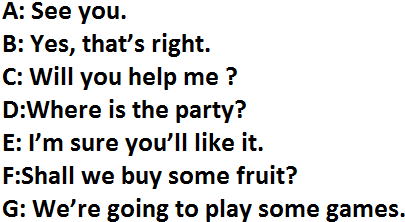4.Why is it that some people seem to learn several languages without any effort,while for others learning just one foreign language is neither enjoyable nor successful?What makes learning a new language so easy for some and so difficult or others.
We each have our own preferred way of learning as a result of our cultural and educational backgrounds and our personalities.Experts have identified different learning styles.
Visual Learners usually enjoy reading and prefer to see an image of the words they are learning.They like looking at pictures and flashcards.Auditory Learners,on the other hand,prefer to learn by listening.They enjoy conversations and talking to others.They don't need to see words written down.One study revealed that Japanese students tend to be Visual Learners,while English-speaking American,prefer the auditory learning style.
Some people like to learn by using their hands to touch objects,while others like to move around and need frequent breaks from sitting at a desk.
There are Analytical Learners,meaning they enjoy understanding how the language works.They love studying grammar rules and like to focus on details,whereas Global Learners are more interested in communicating their ideas and are not worried about whether what they say is grammatically correct.
In spoken English,the Japanese tend to be Reflective Learners.They think carefully before they speak to ensure their message is accurate.They do not make so many mistakes but their communication is slower.European learners tend to be mote Impulsive Learners.They speak more fluently and worry about how well they are communicating rather than how many mistakes they are making.
So,to do well in a language,you should identify your style and try to find a class that will teach you the way you want to learn.For example,if you are a Reflective Learner,you may not do so well in a purely conversational class and as an Auditory Learner,you probably don't want to do so much reading.In fact if you are an Auditory Learner,you are probably not enjoying yourself right now!
46.The passage mainly talks aboutD.
A.the difficult learning styles of some people
B.the easy learning ways of,other people
C.the different learning styles of the Japanese
D.the different learning methods of all the people
47.Which of the following phrases isn't connected with the learning style?C
A.The way people are taught to learn a language.
B.The place where people are from.
C.The size of people.
D.The kind of person people are.
48.Visual Learners like toA.
A.see things B.touch things
C.hear things D.do things
49.Auditory Learners like toA.
A.hear things
B.buy things
C.destroy things
D.paint things
50.Analytical LearnersC.
A.are similar to Global Learners
B.never worry about mistakes
C love to study details
D.do well in conversation.
分析 为什么有些人似乎学习几种语言没有任何努力,而对另一些人来说学习一门外语是既不快乐也不成功?是什么让学习一门新语言对一些人很容易而对其他人很困难.
我们每个人都有自己的喜欢的方式是因为我们的文化和教育背景的不同和我们的个性的不同.专家们已经确定了不同的学习风格.视觉学习者通常喜欢阅读,更喜欢看到他们所学单词的图片文字.他们喜欢看图片和抽认卡.听觉型学习者则相反,他们倾向于通过听来学习.他们喜欢情景对话和与别人交谈,他们不需要看到记下的单词.一项研究显示,日本学生往往是视觉型学习者,而说英语的美国人,喜欢听觉学习风格.有些人喜欢学习使用他们的手触摸物体来学习,而另一些人喜欢四处走动,需要频繁的休息坐在桌子上.有一些善于分析学习者,他们喜欢了解语言是如何工作的,他们爱学习语法规则和关注细节;然而全球学习者对如何交流他们的想法更感兴趣,他们不担心他们所说的是否符合语法是.
关于英语口语,日本人倾向于反光学习者,他们在说话之前要仔细想想,确保他们的信息精确.他们不会犯这么多错误但和他们的沟通是比较慢.欧洲学习者往往是小错冲动学习者.他们说得更流利,他们担心交流的好坏,而不担心犯多少错误.所以要学好一门语言,你应该确定你的风格,尝试找到你想要的能教会的机构,.举例说,如果你是一个反光的学习者,你就不可能成为一个纯粹的会话类和听觉学习者,你就不想都很多东西.事实上如果你是一个听觉学习者,你就不可能享受现在的你.!
解答 46.总结大意题.根据全文意思,可知本文主要讲述了人们学外语的几种方法.故选:D.
47.推理判断题.根据文章讲述的学习方式的有关因素,可知学习方式和人的身高无关.故选:C.
48.细节理解题.根据文章第二段前半部分的阐述,可知视觉学习者喜欢看东西来达到学习的目的.故选:A.
49.细节理解题.根据文章第二段对听觉型学习者的分析,可知听觉型学习者通过听来学习.故选:A.
50.细节理解题.根据倒数第三段"They love studying grammar rules and like to focus on details,"可知.故选:C.
点评 通读全文,了解大意.细读题目出现的段落,最后再读全文,校对答案.




